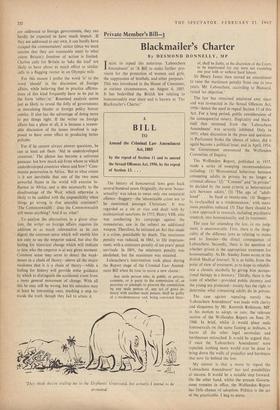Private Member's Bill-3
Blackmailer's Charter
By DESMOND DONNELLY, MP T SEEK to repeal the notorious `Labouchere 1.Amendment' to 'A Bill to make further pro- vision for the protection of women and girls, the suppression of brothels, and other purposes.' This was introduced in the House of Commons, in curious circumstances, on August 6, 1885. It has bedevilled the British law relating to homosexuality ever since and is known as 'The Blackmailer's Charter.° A
BILL
TO Amend the Criminal Law Amendment Act, 1885 by the repeal of Section 11 and to amend the Sexual Offences Act, 1956, by the repeal of Section 13. . . .
The history of homosexual laws goes back several hundred years. Originally, the term 'homo- sexuality' was taken to mean only one unnatural offence—buggery—the `abominable crime not to be mentioned amongst Christians.' 1t was regarded as a sin or vice and dealt with by ecclesiastical sanctions. In 1553, Henry VIII. who was conducting his campaign against the monasteries, saw in the subject an additional weapon. Therefore, he initiated an Act that made it a crime, punishable by death. The maximum penalty was reduced, in 1861, to life imprison- ment, with a minimum penalty of ten years' penal servitude. In 1891, !he minimum penalty was abolished, but the maximum was retained.
Labouchere's intervention took place during the Report stage of the Criminal Law Amend- ment Bill when he rose to move a new clause: Any male person who, in public or private, commits, or is party to the commission of, or procures or attempts to procure the commission by any male person of, any act of gross in- dency with another male person, shall be guilty of a misdemeanour and, being convicted there- of, shall be liable, at the discretion of the Court, to be imprisoned for any term not exceeding one year with or without hard labour.
Sir Henry James then moved an amendment to raise the maximum penalty from one to two years. Mr. Labouchere, according to Hansard, raised 'no objection.'
The law has remained unaltered ever since and was re-enacted in the Sexual Offences Act, I956—hence the need to repeal Section 13 of this Act. For a long period, public consideration of the consequential misery, illogicality and black- mail that stemmed from the Tabouchere Amendment' was severely inhibited. Only in 1953, when discussion in the press and questions in Parliament broke the silence of taboo, did it again become a political issue; and in April, 1954, the Government announced the Wolfenden Committee of Inquiry.
The Wolfenden Report, published in 1957, made a series of sweeping recommendations including: (I) 'Homosexual behaviour between consenting adults in private be no longer a criminal offence.' (2) "Consent" and "in private" be decided by the same criteria as heterosexual acts between adults.' (3) 'The age of "adult- hood" . . . be fixed at twenty-one.' (4) 'Buggery b. re-classified as a misdemeanour,' with maxi- mum penalties reduced. (5) That there should be a new approach to research, including psychiatric research, into homosexuality and its treatment.
The case for amending the law, in my judg- ment, is unanswerable. First, there is the illogi- cality of the different laws as relating to males and to females--the direct consequence of Labouchere. Secondly, there is the question of whether prison is the appropriate treatment for homosexuality. As Dr. Stanley Jones wrote in the British Medical Journal, `It is as futile, from the point of view of treatment, as to hope to rehabili- tate a chronic alcoholic by giving him occupa- tional therapy in a brewery.' Thirdly, there is the issue of whether—provided public decency and the young are protected—society has the right to determine what consenting adults do in private.
The case against repealing merely the `Labouchere Amendment' was made with clarity and eloquence by Mr. Kenneth Robinson, MP, in his motion to adopt, in tow, the relevant section of the Wolfenden Report on. June 29, 1960. In brief, whilst it would place male homosexuals on the same footing as lesbians, it leaves all the other legal anomalies and harshnesses untouched. It would be argued that, if once the labouchere Amendment' were repealed, nothing more would ever be done to bring down the walls of prejudice and harshness that now lie behind the law.
My answer is that a move to repeal the `Labouchere Amendment' has real possibilities of success. It would be a notable step forward. On the other hand, whilst the present Govern- ment remains in office, the Wolfenden Report has little chance of adoption. Politics is the art of the practicable. I beg to move.


































 Previous page
Previous page